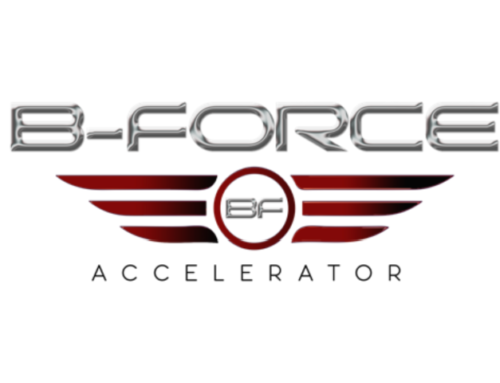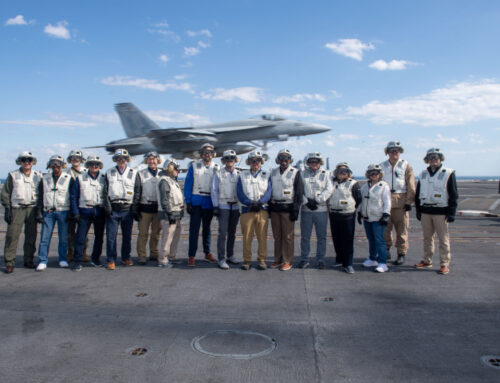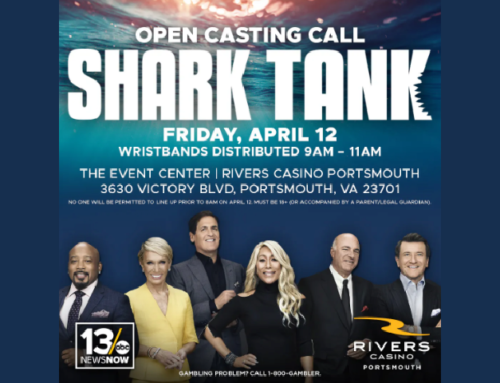From Virginia Business By KATHERINE SCHULTE
When Virginia Commonwealth University closed its buildings in spring 2020, then-student Julien Reininger wasn’t deterred from his entrepreneurial pursuits. In the kitchen of his parents’ Springfield home, Reininger ran a dehydrator for eight hours at a time, creating vegan jerky from canned jackfruit and developing different marinades.
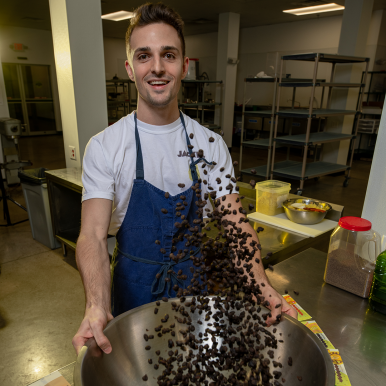
Julien Reininger launched his vegan jerky business, Jacked! Jackfruit Jerky, as a college student with the help of Virginia Commonwealth University’s da Vinci Center for Innovation and its pre-accelerator program. Photo by Matthew R.O. Brown
“I’m sure when I started doing it, they were a little bit confused. Like, ‘Why is he dehydrating jackfruit?’ … They’re definitely patient,” he says of his parents.
Earlier that semester, Reininger had joined a startup pre-accelerator program meant to prepare student entrepreneurs to join external accelerator programs like Lighthouse Labs. Run by VCU’s entrepreneurship center, the da Vinci Center for Innovation, the VCU Pre-X program allows cohorts of about 50 teams and/or solo entrepreneurs to share and critique ideas in small groups and meet with mentors.
A 2021 VCU graduate who received his master’s of product innovation degree from the university in 2022, Reininger received advice specific to his business from the VCU Pre-X program, and learned basics such as how to create prototypes. Mentors pointed out that his product needed to be shelf-stable and that his packaging needed nutrition labels.
“That’s when I started really playing with the recipe, making sure the flavors were still strong and unique, but also the salt levels weren’t through the roof, and sugars were relatively low compared to other jerkies,” Reininger says. “That was something I was introduced to that I never really thought of, but it’s probably one of the most important parts.”
The da Vinci Center is one of multiple entrepreneurship centers housed in Virginia business schools that are aiding students across disciplines to start their own companies or broaden their skillsets, through incubator programs, pitch competitions and other hands-on experiences.
Although some offer for-credit courses, many serve students on an extracurricular basis, providing students real-world experience and teaching in-demand entrepreneurial skills that are useful even to people who don’t want to start their own businesses.
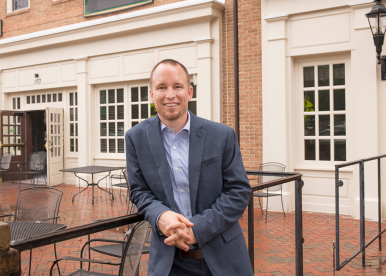
Entrepreneurial thinking is useful across industries, whether or not a student hopes to start their own business, says Graham Henshaw with William & Mary’s Alan B. Miller Entrepreneurship Center. Photo by Mark Rhodes
“We’re not saying … ‘Hey, don’t do physics or psychology. Do entrepreneurship instead!’ We are saying, ‘Do those things. Get that deep expertise in that one sector, but add entrepreneurial thinking as a layer on top of that,’” says Graham Henshaw, executive director of the Alan B. Miller Entrepreneurship Center, part of William & Mary’s Raymond A. Mason School of Business. The Miller Center, which offers programming like workshops, pitch
competitions and guest speakers, had
439 students across 41 majors access it in some way during the 2021-22 school year.
Natalie Marcotullio, a 2019 William & Mary graduate, competed in multiple pitch competitions through the Miller Center. She’s now head of growth and operations for Navattic, a New York software company founded in 2020 that helps businesses create interactive product demos.
“I think I wouldn’t have been prepared at all for the startup world, honestly, without the entrepreneurship center,” she says. “I think the No. 1 thing I learned was just that it’s OK to try things and fail and experiment.”
Garret Westlake, the da Vinci Center’s executive director, emphasizes that businesses want students with hands-on experience.
“It’s been historically [that] you had an MBA or you had an MFA or you had an engineering degree, and then on the job you had to be taught these other aspects,” he says. “And now you have graduates coming out that … are able to jump right in.”
Getting set
Multiple Virginia centers operating in business schools offer accelerator or incubator programs for aspiring entrepreneurs. For example, James Madison University’s Gilliam Center for Entrepreneurship’s Dukes Venture Accelerator is a paid, intensive summer internship open to undergraduate and graduate students as well as alumni who graduated the preceding May. Each student receives $4,000 for the six-week program, and each startup receives up to $10,000 in reimbursable funds for their business needs. Last year, the program hosted 10 startups.
Lucas Warner, a JMU student who was set to graduate in December 2022, joined the program for help marketing his business, Groovy Power Washing.
“We get updates, we learn how to put the business into practice,” Warner says, noting that Gilliam Center Executive Director Suzanne Bergmeister “encouraged us to just get out of the building and just try to make it happen.”
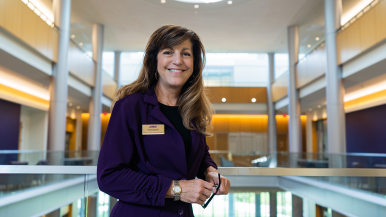
Programs like business incubators for student-led startups “plant the seed of entrepreneurship,” says Suzanne Bergmeister with James Madison University’s Gilliam Center for Entrepreneurship. Photo courtesy James Madison University
Malique Middleton, a 2021 JMU biology graduate who’s now enrolled in VCU’s graduate pre-med program, participated in JMU’s incubator, accelerator and seed funding programs when founding his skin care products business, Gewd Botanicals LLC. “I think the most important thing that JMU gave me was … the opportunity to pick people’s minds who are already experts in … various fields” like accounting, he says.
At VCU, Reininger joined the center’s Shift Retail Lab to gather feedback on his prototypes’ branding and flavors. Students can sell products in events like pop-up holiday markets, but for the most part, the lab is for gathering information in four-week cohorts, which began in January 2022. Through taste testing conducted in the lab, Reininger learned that not everybody liked his spicy flavors and added a savory flavor, miso ginger.
In Charlottesville, the University of Virginia’s i.Lab Incubator, run by the Darden School of Business’ Batten Institute, supports up to 25 startups and runs each March to December.
From March to May, students work with U.Va. School of Law students to incorporate their ventures and get documents like service agreements in order. During i.Lab’s full-time summer phase, students have one-on-one check-ins with mentors and meet with potential customers. Also during the summer portion, student teams receive grants as long as their team has a minimum viable product. In 2022, teams each received $5,500 at the beginning of June and another $5,500 at the end of the summer program.
Once the summer phase concludes, students participate in Demo Day, presenting their summer work and asking audience members to take actions such as signing up for their newsletters or visiting their websites.
“What they’re learning is how to solicit and understand feedback and apply it … to their product, service and company at large,” says Jason Brewster, Darden’s director of venture programs.
i.Lab participants can also apply to make a presentation to the Kathryne Carr Award for Entrepreneurial Excellence selection committee, which awards a $25,000 prize to “the entrepreneur(s) that best embody magnetic and selfless leadership and whose venture demonstrates clear potential for commercial success.”
Starting up
Virginia Tech’s Apex Center for Entrepreneurs in Blacksburg does away with the cohort model, however, allowing students to join an accelerator-style program whenever they need help. Student startup teams can meet with Executive Director Derick Maggard and Sean Collins, managing director of the Startup Hokies program, for assistance with testing concepts, assessing risk and connecting with alumni.
Tim Pote, who received a doctorate from Tech in 2021, is co-founder and CEO of Element Exo Inc., formerly Maroon Assistive Technologies Inc., which manufactures exoskeletons to protect workers’ backs when they lift heavy objects. Collins and Maggard helped connect his team to Tech’s network, Pote says. “We actually got our first customer through the Apex Center. It was an alumni connection” to a pallet manufacturer in St. Louis, Pote says.
About 40 or 50 company founders consult the center each school year for help with their startup companies, and about 1,000 students will use Apex Center services, like its coworking space, Collins says. Students from 112 majors have accounts on the center’s coworking space software system.
JMU’s Gilliam Center’s Madison Inc., an academic-year incubator for students at any stage of starting businesses, has a similar rolling admissions setup. Students meet monthly with entrepreneurship faculty fellows — one from each JMU college — and with their cohorts to learn techniques for risk reduction and customer discovery. In November 2022, Madison Inc. had 30 participating students, 15 of whom had majors outside the business school.
“Throughout the program, regardless of where they are in their entrepreneurial journey, we hope to plant the seeds of entrepreneurship, give them tools and resources that they can use either in this venture or the next one or the next one,” says Bergmeister.
Entrepreneurship centers at Virginia business schools also provide student entrepreneurs with opportunities to practice their investor pitches, often with the potential to secure funding.
“When you’re doing pitch competitions, and when you’re introducing your content to people, having a good story is super important,” Reininger says. VCU’s da Vinci Center, he says, helped him develop a fluid story he could tell over and over again.
The VCU center’s pre-accelerator program also culminates in a Demo Day, with students pitching to judges from the venture capital world for seed funding. Reininger, who joined the 2021 cohort rather than finishing virtually in 2020, pitched in May 2021 and won $5,000, which he largely used to incorporate his Richmond-based business and trademark its name, Jacked! Jackfruit Jerky.
Ready to run
U.Va.’s three-phase E-Cup pitch competition runs from late January to May, although students can apply for any phase and don’t have to complete them all. In the first phase, 40 student teams compete for $1,000 grants that only 20 of the teams will win. During the discovery phase, 10 teams compete for $5,000 each, and in the launch phase, five teams present to judges without an audience.
Every other Friday, William & Mary’s Miller Center hosts Rocket Pitches, with students delivering two-minute presentations. The winner receives a Chick-fil-A gift card and is invited to an end-of-semester pitch competition that has a roughly $1,500 award.
Tech’s Apex Center holds KickStart VT events monthly. Student entrepreneurs apply to present to an alumni panel, and accepted applicants are guaranteed a minimum of $250.
Though not as public as some pitch competitions, JMU students can pitch to the Gilliam Center’s Bluestone Seed Fund, a donor-supported fund with two investment cycles per school year. Students or alumni who graduated less than five years ago pitch to the fund’s investment committee, seeking $5,000 in return for 5% equity in their companies. So far, donors have committed $240,000 to the fund, which launched during the 2021-22 school year. The committee has invested in eight companies, with one receiving $10,000.
But seeking seed funding also sometimes requires going outside the university structure. To launch his company, for example, Reininger ran a Kickstarter campaign that ended in September 2022. With the $8,686 he raised, Reininger moved his jerky-making enterprise into Hatch Kitchen, a commercial kitchen in Richmond’s Manchester neighborhood.
In November 2022, he launched Jacked!’s website and secured deals to sell his products through three Richmond retailers: Northside Gourmet Market, Good Foods Grocery and Ellwood Thompson’s Local Market.
Reininger credits the da Vinci Center with helping him get his business off the ground and running: “I would say the da Vinci Center has played a role in every part of the development of Jacked!”



